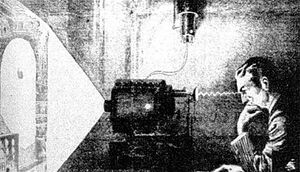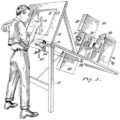Scrying engine: Difference between revisions
| Line 21: | Line 21: | ||
[[John Brunner]] owns a Lee and Turner color projector which has been extensively custom modified for use as a scrying engine. | [[John Brunner]] owns a Lee and Turner color projector which has been extensively custom modified for use as a scrying engine. | ||
The device uses [[Edward Turner]]’s original method for visualizing the [[Computational Human Phantom]] as successive frames on black and white film through red, green and blue filters and to project these sets of three frames superimposed through similar filters. Images are translated through red, green and blue filters into the scrying engine | The device uses [[Edward Turner]]’s original method for visualizing the [[Computational Human Phantom]] as successive frames on black and white film through red, green and blue filters and to project these sets of three frames superimposed through similar filters. Images are translated through red, green and blue filters into the scrying engine kernel at the rate of 16 pictures per second. | ||
Brunner once called it "the best bloody tool I ever bought." | Brunner once called it "the best bloody tool I ever bought." | ||
Revision as of 19:00, 13 June 2016

A scrying engine is any engine which causes or facilitates scrying.
In the News
Canterbury scrying engine computes Mandelbrot set.
Artist-researcher Don Tasmian converts Rotoscope to scrying engine.
The Hamangia figurines computing the Lorenz system.
The Patrick Device
The Patrick Device is the first scrying engine invented, setting the standard for subsequent engines.
Lee and Turner color projector

John Brunner owns a Lee and Turner color projector which has been extensively custom modified for use as a scrying engine.
The device uses Edward Turner’s original method for visualizing the Computational Human Phantom as successive frames on black and white film through red, green and blue filters and to project these sets of three frames superimposed through similar filters. Images are translated through red, green and blue filters into the scrying engine kernel at the rate of 16 pictures per second.
Brunner once called it "the best bloody tool I ever bought."
The Rosenwald sheets
The Rosenwald sheets function as rudimentary scrying engine, apparently providing a matrix (nonfiction) for scrying routines.
Fiction cross-reference
Nonfiction cross-reference
The Crystal Ball by John William Waterhouse. See Scrying (nonfiction).





